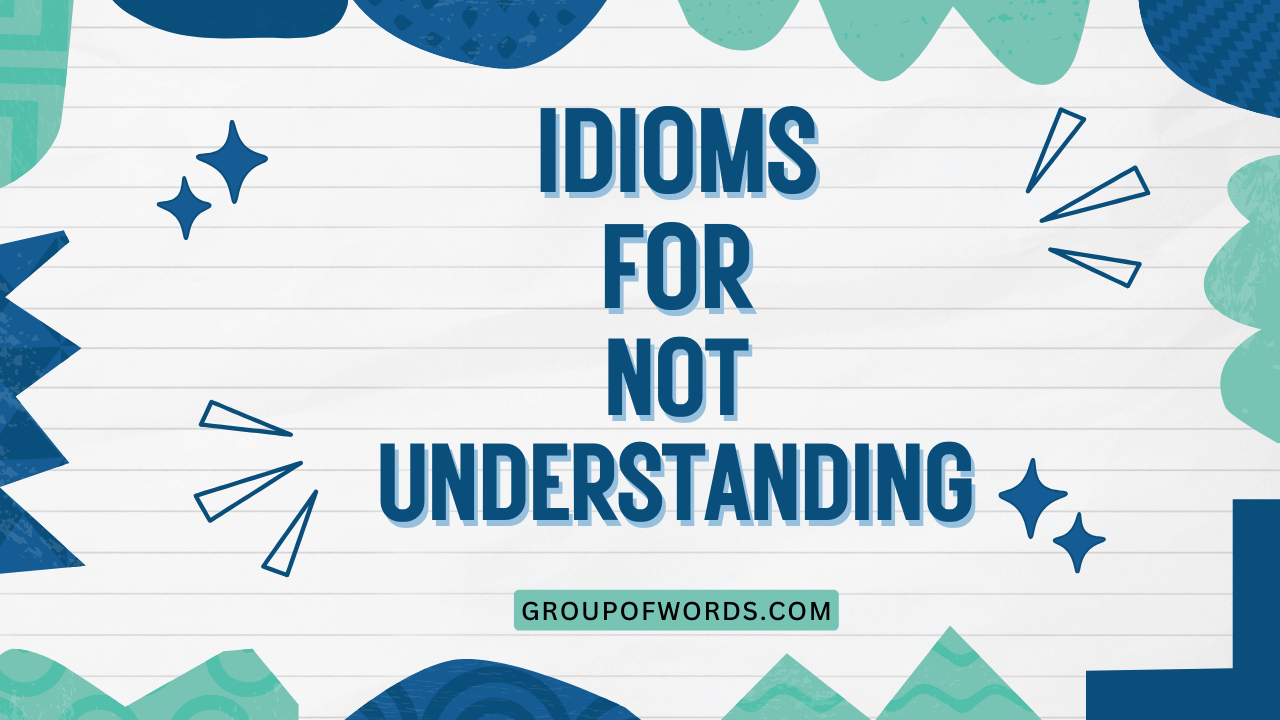Idioms for Not Understanding: A Comprehensive Guide
English is rich with idioms, and mastering them is crucial for achieving fluency and a nuanced understanding of the language. One particularly useful category of idioms involves expressing a lack of comprehension.
These idioms allow you to convey that you don’t understand something in a colorful and engaging way, adding personality to your speech and writing. This article provides a comprehensive guide to idioms related to ‘not understanding,’ exploring their meanings, usage, and providing numerous examples to help you incorporate them into your everyday English.
This guide is beneficial for English language learners of all levels, from beginners seeking to expand their vocabulary to advanced speakers aiming to refine their expressive abilities.
Table of Contents
- Definition: Idioms for Not Understanding
- Structural Breakdown of Idioms
- Types and Categories of Idioms for Not Understanding
- Examples of Idioms for Not Understanding
- Usage Rules for Idioms
- Common Mistakes When Using Idioms
- Practice Exercises
- Advanced Topics: Nuances and Regional Variations
- Frequently Asked Questions
- Conclusion
Definition: Idioms for Not Understanding
An idiom is a phrase or expression whose meaning cannot be understood from the ordinary meanings of the words within it. Idioms for “not understanding” are phrases used to convey that someone fails to comprehend something.
These idioms are often figurative and add color and expressiveness to communication. They are a vital part of everyday conversation and written English.
These idioms can range from simple expressions to more complex phrases, each offering a unique way to express confusion or lack of understanding.
The function of these idioms is primarily communicative, allowing speakers to express their inability to grasp a concept, situation, or statement. They often convey a sense of confusion, disbelief, or even frustration.
The context in which these idioms are used is crucial, as their meaning can vary slightly depending on the situation and the speaker’s intent. Understanding these nuances is key to using idioms effectively and appropriately.
Structural Breakdown of Idioms
Idioms, by their nature, defy straightforward structural analysis. Their meanings are not derived from the literal interpretation of their individual words but rather from a collective, figurative understanding.
However, we can examine some common structural elements found in idioms for “not understanding.”
Many idioms utilize metaphorical language, drawing comparisons to familiar objects or situations to illustrate the feeling of confusion. For example, “It’s all Greek to me” uses the unfamiliarity of the Greek language to represent a complete lack of comprehension.
Other idioms may employ rhetorical devices such as hyperbole (exaggeration) or understatement to emphasize the speaker’s confusion.
Some idioms follow a set phrase structure, meaning the words must appear in a specific order to retain their idiomatic meaning. Changing the word order or substituting words can render the idiom nonsensical or alter its meaning entirely.
For example, “can’t make head or tail of it” has a fixed structure; changing it to “can’t make tail or head of it” would sound unusual and lose the idiomatic force.
Types and Categories of Idioms for Not Understanding
Idioms for not understanding can be categorized based on the specific nuances they convey. Here are some key categories:
General Lack of Understanding
These idioms express a general inability to comprehend something without specifying the reason for the confusion. They are suitable for a wide range of situations where understanding is lacking.
Situations of Complexity or Confusion
These idioms are used when the subject matter is inherently complex or confusing. They often imply that the difficulty in understanding stems from the nature of the information itself.
Expressing Disbelief or Incredulity
These idioms convey not just a lack of understanding but also a sense of disbelief or skepticism. They suggest that the speaker finds the information hard to believe or accept.
When Something is Deliberately Obscure
These idioms are used when the speaker suspects that someone is intentionally making something difficult to understand, often to deceive or mislead.
Examples of Idioms for Not Understanding
The following sections provide examples of idioms categorized by the types described above. Each table contains a variety of idioms with their meanings and example sentences.
General Lack of Understanding
This section provides idioms to describe situations where you generally don’t understand something, without implying a specific reason.
| Idiom | Meaning | Example Sentence |
|---|---|---|
| It’s all Greek to me. | Completely incomprehensible. | The physics lecture was all Greek to me. |
| I don’t get it. | I don’t understand. | I don’t get it – why did she leave so suddenly? |
| I’m lost. | I’m confused and don’t understand. | After the third step, I was completely lost. |
| It’s beyond me. | I’m unable to understand it. | Quantum physics is completely beyond me. |
| I can’t make head or tail of it. | I can’t understand it at all. | I can’t make head or tail of this instruction manual. |
| It’s double Dutch to me. | Completely incomprehensible. | Their conversation about cryptocurrency was double Dutch to me. |
| I’m drawing a blank. | I can’t think of anything; I don’t understand. | When she asked me about the details, I was drawing a blank. |
| The penny hasn’t dropped. | I haven’t understood something yet. | He explained it several times, but the penny still hasn’t dropped. |
| I’m in the dark. | I’m unaware or uninformed. | They kept me in the dark about the changes. |
| I have no clue. | I have no idea or understanding. | I have no clue what he’s talking about. |
| I’m not following. | I don’t understand what you’re saying. | I’m not following – could you explain that again? |
| I’m at sea. | I’m confused and disoriented. | Trying to navigate this new software, I’m completely at sea. |
| It’s all a blur. | It’s confusing and unclear. | The meeting was so fast-paced, it’s all a blur. |
| I’m not with you. | I don’t understand your reasoning or explanation. | I’m not with you – how does that solve the problem? |
| It’s a mystery to me. | I find it completely baffling. | Why she quit her job is a complete mystery to me. |
| I’m stumped. | I can’t figure it out. | I’m stumped on how to solve this puzzle. |
| I’m blanking. | I can’t remember or understand something. | I’m blanking on her name right now. |
| I’m not grasping it. | I’m not understanding it. | I’m not grasping the concept of relativity. |
| It’s fogging my brain. | It’s confusing and making it hard to think. | All these details are fogging my brain. |
| I’m drawing a blank. | Unable to remember or understand something. | I’m drawing a blank on what he said yesterday. |
Situations of Complexity or Confusion
This section features idioms to use when you don’t understand something because it’s complex or confusing.
| Idiom | Meaning | Example Sentence |
|---|---|---|
| Clear as mud. | Not clear at all; very confusing. | His explanation was as clear as mud. |
| It’s a tangled web. | A complicated and confusing situation. | The company’s finances are a tangled web. |
| It’s like a maze. | Complicated and difficult to navigate or understand. | The legal system is like a maze to ordinary people. |
| Lost in the weeds. | Overwhelmed by details and unable to see the bigger picture. | We got lost in the weeds of the project and missed the deadline. |
| It’s all smoke and mirrors. | Deceptive and intended to obscure the truth. | The politician’s promises were just smoke and mirrors. |
| It’s a Gordian knot. | An extremely complex and difficult problem to solve. | The budget negotiations became a Gordian knot. |
| It’s a can of worms. | A situation that is more complicated than it appears. | Opening up that investigation is like opening a can of worms. |
| It’s Greek to me. | Incomprehensible due to complexity. | The computer code he showed me was Greek to me. |
| It’s a riddle wrapped in a mystery inside an enigma. | Extremely mysterious and difficult to understand. | Her behavior is a riddle wrapped in a mystery inside an enigma. |
| I’m swimming upstream. | Struggling against a current of difficulty. | Trying to get this project approved is like swimming upstream. |
| It’s as clear as dishwater. | Not clear at all; very confusing. | The instructions were as clear as dishwater. |
| It’s like navigating a minefield. | Full of hidden dangers and complexities. | Negotiating this contract is like navigating a minefield. |
| It’s a head-scratcher. | Something puzzling or difficult to understand. | The ending of the movie was a real head-scratcher. |
| It’s a convoluted mess. | Extremely complicated and confusing. | The plot of the novel was a convoluted mess. |
| It’s a Chinese puzzle. | Something very complicated and difficult to understand. | The tax laws are a Chinese puzzle to most people. |
| I’m in a fog. | Confused and disoriented. | After the long flight, I was in a fog. |
| It’s a dog’s breakfast. | A complete mess; very confusing. | The report was a dog’s breakfast. |
| It’s a rat’s nest. | A chaotic and confusing situation. | The office paperwork is a rat’s nest. |
| It’s like wading through treacle. | Slow and difficult to understand or progress. | Reading this legal document is like wading through treacle. |
| It’s a jigsaw puzzle. | Complicated and requiring careful piecing together. | Putting together the evidence was like completing a jigsaw puzzle. |
| It’s like untangling spaghetti. | Very complicated and difficult to sort out. | Trying to resolve the dispute was like untangling spaghetti. |
Expressing Disbelief or Incredulity
These idioms show that you don’t just not understand something, but you also find it hard to believe.
| Idiom | Meaning | Example Sentence |
|---|---|---|
| I can’t believe my ears. | I’m shocked and disbelieving. | When she told me she was quitting, I couldn’t believe my ears. |
| I’ll eat my hat. | I’m so sure it won’t happen that I’m willing to bet something absurd. | If he wins the election, I’ll eat my hat. |
| Pull the other one. | I don’t believe you. | “I won the lottery!” – “Pull the other one!” |
| You’re pulling my leg. | You’re teasing or joking with me. | “I saw a unicorn in the park!” – “You’re pulling my leg!” |
| Is the Pope Catholic? | An obvious question with an obvious answer (used sarcastically). | “Is the Pope Catholic?” he asked when I doubted the obvious truth. |
| When pigs fly. | Something that will never happen. | He’ll clean his room when pigs fly. |
| I was born yesterday. | I’m not naive; I don’t believe you. | You can’t fool me; I wasn’t born yesterday. |
| Tell me another one. | I don’t believe what you’re saying. | “I finished all my work.” – “Tell me another one!” |
| That’s a tall tale. | An unbelievable or exaggerated story. | His story about finding a treasure was a tall tale. |
| I’ll believe it when I see it. | I doubt it’s true until I have proof. | They promised to deliver by tomorrow, but I’ll believe it when I see it. |
| Get out of here! | Expression of disbelief or surprise. | “I got a promotion!” – “Get out of here! That’s fantastic!” |
| No way! | Expression of disbelief or strong disagreement. | “They cancelled the event!” – “No way!” |
| Are you kidding me? | Expression of disbelief or annoyance. | “The price doubled!” – “Are you kidding me?” |
| Come off it! | Stop exaggerating or lying. | “I can lift a car!” – “Come off it!” |
| Don’t give me that! | I don’t believe what you’re saying. | “I was late because of traffic.” – “Don’t give me that!” |
| That’s a likely story! | I don’t believe your explanation. | “I lost my homework.” – “That’s a likely story!” |
| Do you take me for a fool? | Do you think I’m stupid enough to believe that? | “The check is in the mail.” – “Do you take me for a fool?” |
| That’ll be the day! | That will never happen. | “He’ll apologize.” – “That’ll be the day!” |
| I wasn’t born yesterday! | I’m not naive; I don’t believe you. | You can’t trick me, I wasn’t born yesterday! |
| You could have fooled me! | I didn’t realize or believe that. | “It rained last night.” – “You could have fooled me, I didn’t even notice!” |
When Something is Deliberately Obscure
These idioms are useful when you suspect someone is making something unclear on purpose.
| Idiom | Meaning | Example Sentence |
|---|---|---|
| Beating around the bush. | Avoiding the main point; not being direct. | Stop beating around the bush and tell me what you really want. |
| Speaking in riddles. | Talking in a confusing or mysterious way. | He’s always speaking in riddles; it’s hard to understand him. |
| Clouding the issue. | Making something more confusing than it needs to be. | He’s clouding the issue with unnecessary details. |
| Hiding behind jargon. | Using technical terms to confuse or impress. | The consultant was hiding behind jargon to justify his fees. |
| Muddying the waters. | Making something unclear or confusing. | He’s muddying the waters with irrelevant information. |
| Obfuscating the truth. | Making the truth unclear or difficult to understand. | The company was accused of obfuscating the truth about its profits. |
| Pulling the wool over someone’s eyes. | Deceiving or tricking someone. | They tried to pull the wool over our eyes with their false claims. |
| Talking in circles. | Speaking without getting to the point. | We were talking in circles and getting nowhere. |
| Playing games. | Being dishonest or manipulative. | Stop playing games and tell me what’s really going on. |
| Stringing someone along. | Deceiving someone by prolonging something. | He’s just stringing her along; he has no intention of marrying her. |
| Dancing around the issue. | Avoiding the main point; not being direct. | The politician was dancing around the issue during the interview. |
| Camouflaging the facts. | Hiding or disguising the truth. | They were accused of camouflaging the facts in their report. |
| Being evasive. | Avoiding giving a direct answer. | He was being evasive when asked about his whereabouts. |
| Concealing information. | Hiding important details. | They were accused of concealing information from the public. |
| Misleading the public. | Giving a false impression to the public. | The advertisement was accused of misleading the public. |
| Sugarcoating the truth. | Making something seem better than it is. | They were sugarcoating the truth about the company’s financial problems. |
| Speaking with forked tongue. | Speaking insincerely or deceptively. | He’s known for speaking with a forked tongue. |
| Burying the lead. | Presenting the most important information last or in an obscure way. | The report buried the lead, making it hard to understand the main findings. |
| Creating a smokescreen. | Creating a diversion to hide the truth. | The scandal was a smokescreen to distract from the real issues. |
| Playing dumb. | Pretending to be ignorant or unaware. | He’s playing dumb to avoid taking responsibility. |
Usage Rules for Idioms
Using idioms correctly requires understanding their specific meanings and contexts. Here are some key rules to keep in mind:
- Context is Crucial: Always consider the context of the conversation or writing. Idioms can be inappropriate in formal settings or when communicating with someone unfamiliar with colloquial language.
- Know the Meaning: Be absolutely sure you understand the idiom’s meaning before using it. Misusing an idiom can lead to confusion or miscommunication.
- Word Order: Many idioms have a fixed word order. Changing the order can alter or negate the meaning.
- Audience Awareness: Be mindful of your audience. Some idioms are culturally specific and may not be understood by everyone.
- Avoid Overuse: While idioms can add color to your language, overuse can make your speech sound unnatural or forced.
Remember that idioms are often figurative and should not be taken literally. Understanding the underlying metaphor or analogy is key to grasping the idiom’s meaning and using it effectively.
Common Mistakes When Using Idioms
One of the most common mistakes is misinterpreting the meaning of an idiom. Since idioms are figurative, their literal interpretation can be misleading.
Another common error is using idioms in inappropriate contexts, such as formal writing or professional presentations. Additionally, many learners make mistakes with word order or by substituting words within the idiom, which can change its meaning or make it nonsensical.
| Incorrect | Correct | Explanation |
|---|---|---|
| It’s all Greek for me. | It’s all Greek to me. | The correct preposition is “to,” not “for.” |
| I can’t do head or tails of it. | I can’t make head or tail of it. | The correct verb is “make,” not “do.” |
| I’m lost in the grasses. | I’m lost in the weeds. | The correct noun is “weeds,” not “grasses.” |
| They were hitting around the bush. | They were beating around the bush. | The correct verb is “beating,” not “hitting.” |
| He said, “Pull my leg!” | He said, “You’re pulling my leg!” | The correct form includes “You’re” to indicate the action. |
Practice Exercises
Test your understanding of idioms for “not understanding” with these exercises. Choose the correct idiom to complete each sentence.
- The lecture was so complicated; it was _____. (a) clear as a bell (b) clear as mud (c) clear as day
- I tried to read the instructions, but I _____. (a) couldn’t make head or tail of it (b) couldn’t make head or body of it (c) couldn’t make body or tail of it
- They were _____ about their plans, so I don’t know what’s happening. (a) in the light (b) in the dark (c) in the sun
- When he said he won the lottery, I told him to _____. (a) pull my leg (b) pull the other one (c) pull his leg
- The company is _____ about its financial situation. (a) beating around the bush (b) hitting around the bush (c) walking around the bush
- Trying to understand quantum physics is _____. (a) beyond me (b) beneath me (c) beside me
- The details are _____, and I can’t focus on the main issue. (a) helping the waters (b) muddying the waters (c) cleaning the waters
- I _____ when she asked me about the project details. (a) drew a picture (b) drew a blank (c) drew a conclusion
- His explanation was so confusing; it was like a _____. (a) straight line (b) simple path (c) maze
- If he ever apologizes, _____. (a) when dogs fly (b) when cats fly (c) when pigs fly
Answer Key:
- (b) clear as mud
- (a) couldn’t make head or tail of it
- (b) in the dark
- (b) pull the other one
- (a) beating around the bush
- (a) beyond me
- (b) muddying the waters
- (b) drew a blank
- (c) maze
- (c) when pigs fly
Exercise 2: Rewrite the following sentences using an appropriate idiom for “not understanding.”
- I don’t understand this at all.
- The situation is very confusing.
- I find that hard to believe.
- He’s avoiding the main point.
- I’m completely lost.
- The explanation was unclear.
- I have no idea what you’re talking about.
- They are trying to trick us.
- I can’t remember the details.
- It’s a complicated problem.
Suggested Answers:
- It’s all Greek to me.
- It’s a tangled web.
- I can’t believe my ears.
- He’s beating around the bush.
- I’m at sea.
- It was as clear as mud.
- I have no clue what you’re talking about.
- They are trying to pull the wool over our eyes.
- I’m drawing a blank on the details.
- It’s a Gordian knot.
Exercise 3: Fill in the blanks with the correct idiom.
| # | Sentence | Possible Answers |
|---|---|---|
| 1 | I can’t understand their new policy; it’s ____________________. | (a) as clear as day (b) as clear as mud (c) crystal clear |
| 2 | He’s ____________________; he never gives a straight answer. | (a) speaking directly (b) speaking in riddles (c) speaking clearly |
| 3 | If they actually finish the project on time, ____________________. | (a) when cats fly (b) when birds sing (c) when pigs fly |
| 4 | I’m ____________________ on how to solve this problem. | (a) stumped (b) jumping (c) running |
| 5 | They are ____________________ by using technical terms no one understands. | (a) clarifying the issue (b) clouding the issue (c) simplifying the issue |
| 6 | I don’t believe his excuse; ____________________! | (a) tell me another one (b) tell me one (c) tell me the one |
| 7 | This legal document is so hard to understand; it’s like ____________________. | (a) wading through water (b) wading through treacle (c) wading through air |
| 8 | I’m ____________________; I don’t know what’s going on. | (a) in the light (b) in the know (c) in the dark |
| 9 | Don’t ____________________; just tell me the truth. | (a) walk around the bush (b) run around the bush (c) beat around the bush |
| 10 | Trying to understand this software is like ____________________. | (a) navigating a roadmap (b) navigating a minefield (c) navigating a highway |
Answer Key:
| # | Answer |
|---|---|
| 1 | (b) as clear as mud |
| 2 | (b) speaking in riddles |
| 3 | (c) when pigs fly |
| 4 | (a) stumped |
| 5 | (b) clouding the issue |
| 6 | (a) tell me another one |
| 7 | (b) wading through treacle |
| 8 | (c) in the dark |
| 9 | (c) beat around the bush |
| 10 | (b) navigating a minefield |
Advanced Topics: Nuances and Regional Variations
Beyond the basic usage, idioms possess subtle nuances that require a deeper understanding. The emotional tone conveyed by an idiom can vary depending on the speaker and the context.
For example, saying “It’s all Greek to me” can express frustration, humor, or resignation, depending on the situation and the speaker’s tone of voice.
Furthermore, some idioms have regional variations. An idiom commonly used in one country or region may be unfamiliar or have a different meaning in another.
For instance, some idioms might be more prevalent in British English compared to American English, or vice versa. Being aware of these regional differences is essential for effective communication and avoiding misunderstandings.
The historical origins of idioms can also add depth to their understanding. Many idioms have fascinating stories behind them, often rooted in historical events, cultural practices, or literary references.
Exploring the origins of idioms can provide valuable insights into their meanings and usage.
Frequently Asked Questions
- What is the difference between an idiom and a proverb?
An idiom is a phrase whose meaning is not deducible from the literal meanings of the words, while a proverb is a short, well-known saying that expresses a general truth or piece of advice. Idioms focus on figurative language, whereas proverbs offer wisdom or guidance.
- How can I improve my understanding of idioms?
Read widely, listen to native speakers, and pay attention to the context in which idioms are used. Keep a notebook of new idioms and their meanings, and practice using them in your own speech and writing. Online resources and idiom dictionaries can also be helpful.
- Are idioms important for learning English?
Yes, idioms are essential for understanding native speakers and achieving fluency. They add color and expressiveness to your language and are frequently used in everyday conversation and written English.
- Is it okay to use idioms in formal writing?
Generally, it’s best to avoid idioms in formal writing, as they can sound too informal or colloquial. However, there may be exceptions depending on the specific context and audience. When in doubt, it’s safer to use more direct and literal language.
- How do I know when to use an idiom?
Consider your audience, the context of the conversation, and the specific meaning you want to convey. If you’re unsure whether an idiom is appropriate, it’s best to err on the side of caution and use more direct language.
- Are there any online resources for learning idioms?
Yes, there are many excellent online resources for learning idioms, including idiom dictionaries, websites with idiom lists and explanations, and language learning apps that focus on idioms. Some good starting points are The Free Dictionary, Merriam-Webster’s Learner’s Dictionary, and various language learning blogs.
- Why is it difficult to understand idioms?
Idioms are difficult because their meanings are not literal; they are figurative expressions that have evolved over time. Understanding them requires cultural knowledge and familiarity with the specific context in which they are used.
- Can I create my own idioms?
While it’s possible to create new phrases, they won’t be considered idioms unless they gain widespread use and acceptance within a language community. Idioms are typically established expressions with a history and cultural context.
Conclusion
Mastering idioms for “not understanding” is a valuable step towards achieving fluency and a deeper comprehension of the English language
. By understanding these idioms, you can more effectively communicate your confusion, express disbelief, or recognize when someone is deliberately obscuring information.
Continue to practice using these idioms in various contexts to enhance your language skills and cultural understanding. Remember, language learning is an ongoing process, and every new idiom you learn brings you one step closer to mastering the art of communication.






